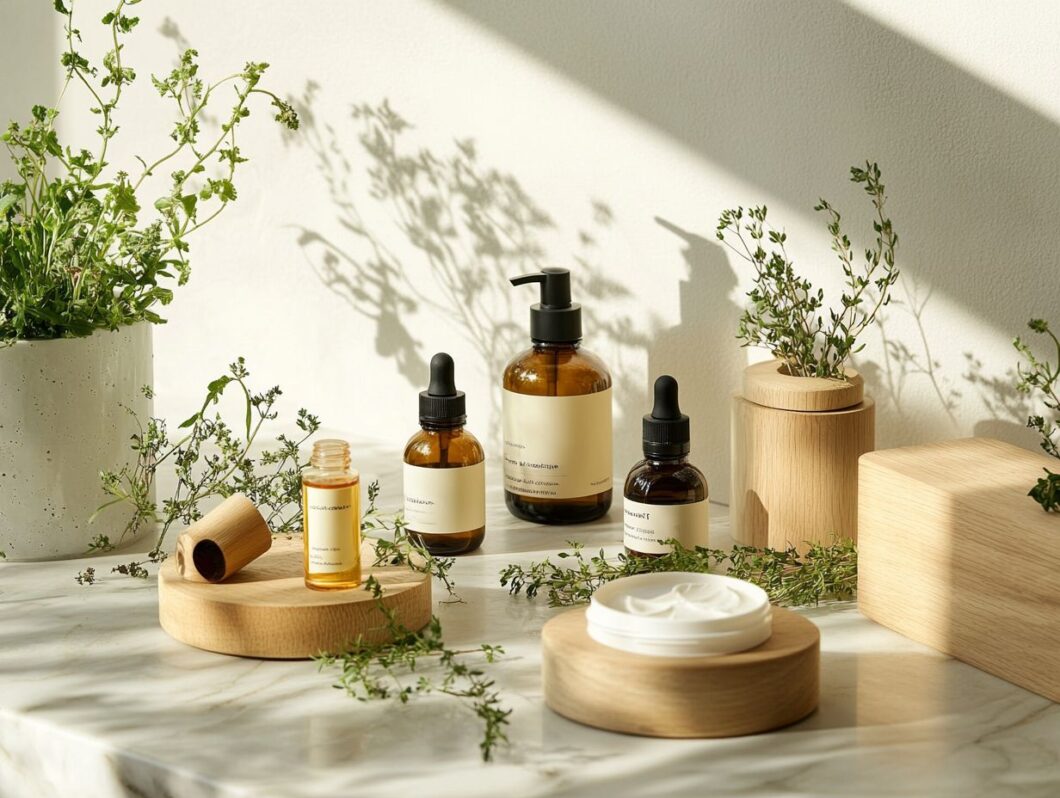In recent years, I have observed a significant shift toward organic skincare as more individuals seek natural alternatives for their beauty needs. This discussion delves into the numerous benefits of adopting an organic skincare routine, ranging from improving skin health to minimizing environmental impact.
I aim to provide insight on how to identify one’s skin type, build an effective routine, and discern which ingredients to embrace or avoid. Whether considering DIY products or opting for store-bought alternatives, I will outline strategies to maintain consistency and achieve radiant skin using organic solutions.
Key Takeaways:
Benefits of an Organic Skincare Routine
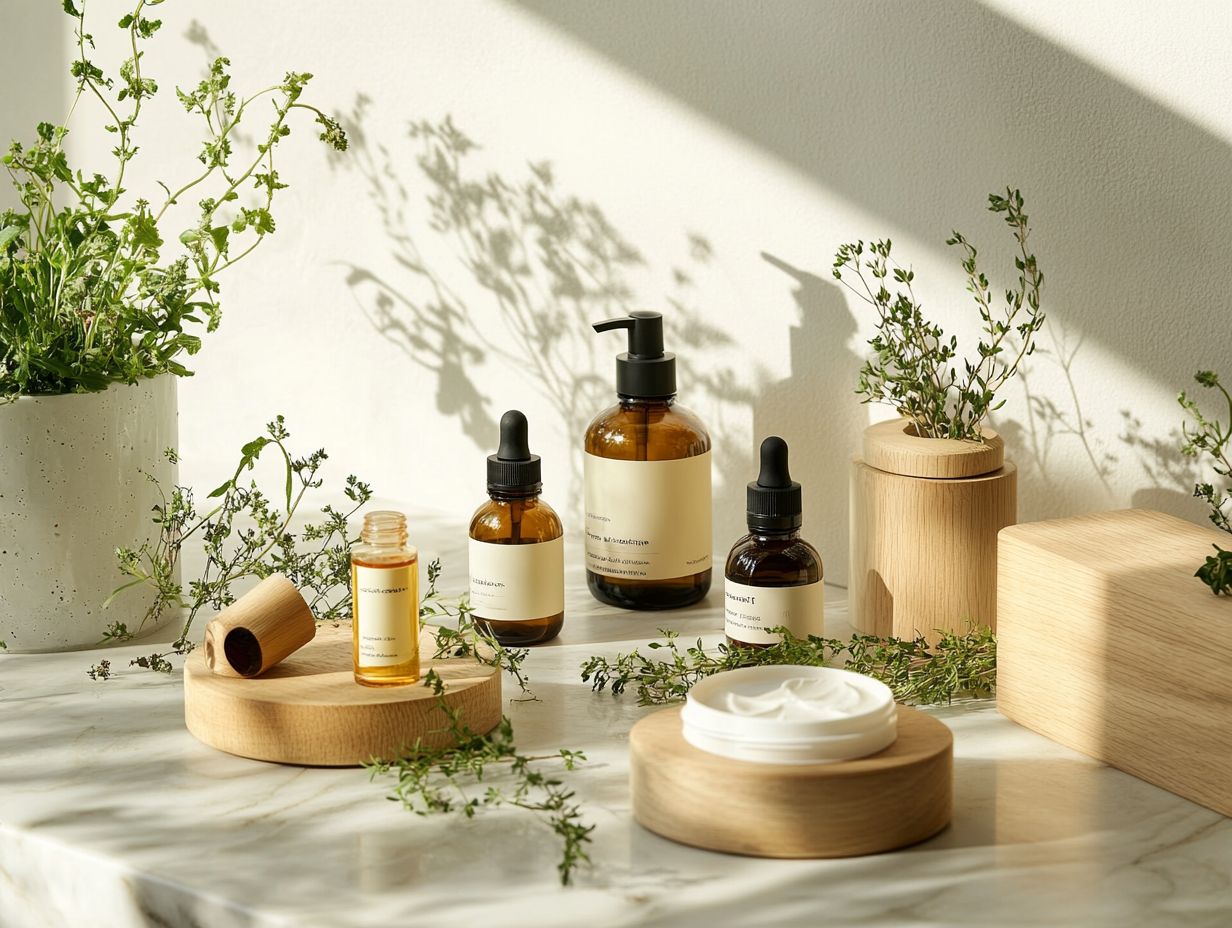
An organic skincare routine offers numerous benefits, especially for individuals looking to address specific skin concerns such as acne while promoting overall skin health.
By incorporating natural ingredients that are free from harsh chemicals and synthetic additives, I can enhance my skincare regimen with effective homemade remedies that nourish and protect a variety of skin types.
Additionally, organic products typically include moisturizing oils and essential oils, which not only hydrate the skin but also deliver a range of beauty benefits. This makes them an excellent choice for anyone pursuing a holistic approach to skincare.
Why Choose Organic Products?
Choosing organic skincare products over those with harsh ingredients is crucial for maintaining healthy skin, especially for individuals with sensitive or acne-prone skin types. I find that organic products are formulated with natural ingredients that nurture the skin without causing irritation or adverse reactions.
These products often include beneficial components such as lavender essential oil and hemp seed oil, which are known for their soothing and moisturizing properties, ultimately improving overall skin texture and appearance.
I have observed that many consumers are becoming increasingly aware of the long-term negative effects that synthetic chemicals can have, including disruptions to hormonal balance and allergic skin reactions. By opting for how to build a fully organic skincare routine, I not only protect my skin but also embrace a cleaner beauty routine.
Product reviews frequently highlight transformative experiences, with users reporting clearer, healthier skin after switching to organic options. The absence of parabens and sulfates is often cited as a key factor in these positive outcomes.
With the growing emphasis on transparency, choosing organic products enables consumers to make informed decisions about what they apply to their skin, ensuring that they select safer and more effective solutions.
Identifying Your Skin Type
Identifying my skin type is a crucial first step in establishing an effective skincare routine that meets my individual needs while ensuring I receive maximum benefits from my daily products.
Understanding whether I have oily, dry, combination, or sensitive skin guides my choices for daily moisturizers, oil cleansing methods, and soothing toners, ultimately leading to healthier skin.
This identification process not only allows me to tailor my skincare regimen but also enhances the effectiveness of treatments for specific concerns such as acne.
Determining Your Skincare Needs
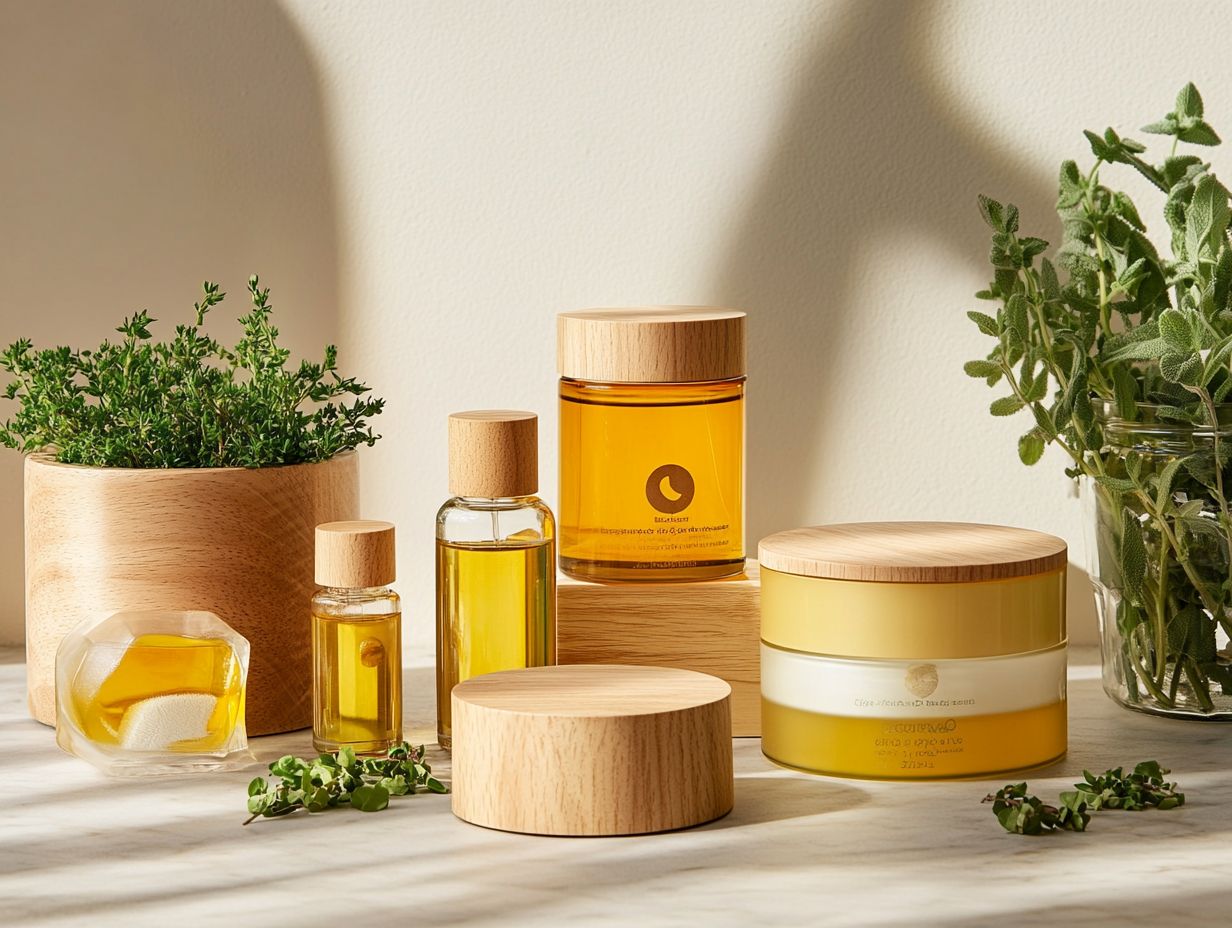
Determining my skincare needs requires a thorough understanding of my specific skin type and the unique challenges it presents, such as dryness, oiliness, or acne.
By identifying my skin’s requirements, I can tailor my routine with appropriate products, including moisturizing oils and chemical exfoliation treatments that effectively address my concerns. Each skin type has distinct needs, and a personalized approach is essential for achieving my desired results.
For example, I recognize that individuals with dry skin may benefit from richer, hydrating oils like jojoba or rosehip, while those with oily or acne-prone skin should opt for lighter options such as argan or squalane to prevent clogging pores.
Incorporating gentle chemical exfoliants, such as alpha hydroxy acids for dry skin or beta hydroxy acids for oily skin, can assist in removing dead skin cells and promoting a smoother texture.
It is crucial for me to perform a patch test and closely observe how my skin reacts, ensuring that I am using products that genuinely enhance my skin’s health and radiance.
Building Your Routine
Building an effective skincare routine necessitates a structured approach that encompasses various steps aimed at achieving optimal skin health. I find that having a step-by-step guide is essential for ensuring the incorporation of all necessary elements.
This includes:
- Oil cleansing to remove impurities
- Applying a facial oil for nourishment
- Concluding with a daily moisturizer to lock in hydration
This systematic method not only enhances the appearance of my skin but also contributes to its long-term health by preventing issues such as acne and dryness.
Step-by-Step Guide to Creating an Organic Skincare Routine
Creating an organic skincare routine requires a methodical approach that incorporates best practices and ingredients to support overall skin health. I begin with a gentle cleanser that respects my skin’s natural balance, followed by a soothing toner to prepare my skin for subsequent treatments.
At this stage, I often incorporate homemade remedies and essential oils to provide additional benefits, resulting in a comprehensive skincare regimen tailored to my unique needs.
Once my skin is thoroughly cleansed and toned, I focus on treatment options that address specific concerns, whether it’s hydration, anti-aging, or acne control. For instance, I use a lightweight serum infused with botanical extracts that nourishes my skin effectively while remaining gentle.
Essential oils, such as tea tree for its antibacterial properties or lavender for its calming effects, can be blended into a carrier oil for targeted spot treatment or added to my moisturizers.
Additionally, I include homemade remedies like honey masks for hydration or oatmeal scrubs for gentle exfoliation, leveraging nature’s powerful ingredients to revitalize and rejuvenate my complexion. These integrations not only reinforce the benefits of organic products but also allow me to personalize my routine, ultimately leading to healthier skin with each step.
Ingredients to Look For and Avoid
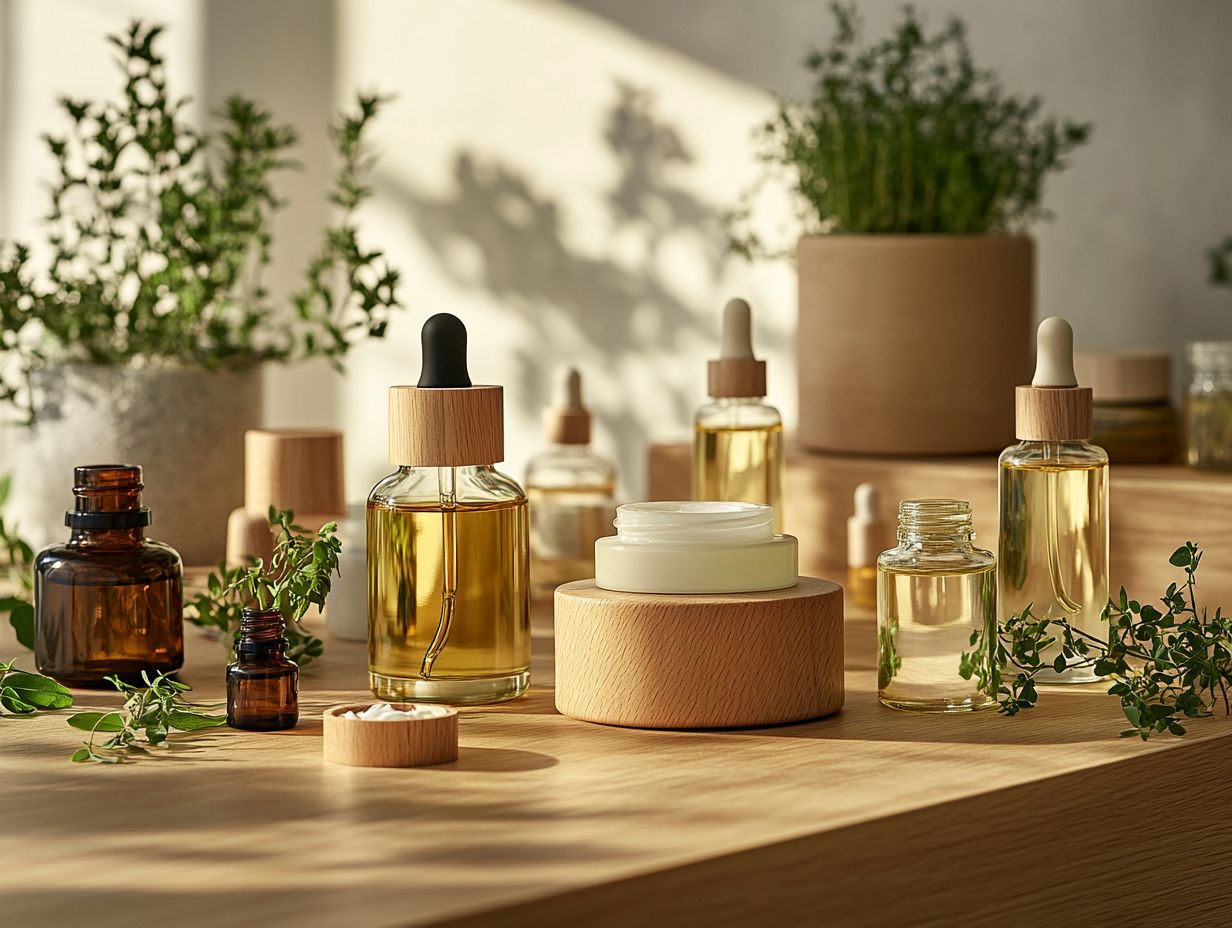
Understanding which ingredients to seek out and avoid is essential for anyone dedicated to natural skin care, especially in the area of organic products.
While I prioritize selecting ingredients that promote skin health, such as raw manuka honey and apple cider vinegar, I also recognize the importance of avoiding harsh components that can lead to irritation or long-term damage.
Having this knowledge enables me to make informed decisions that align with my skincare objectives.
Common Harmful Ingredients to Avoid
I am aware that common harmful ingredients in many skincare products can have detrimental effects on my skin, particularly when managing conditions such as acne. Ingredients like sulfates, parabens, and synthetic fragrances often lead to irritation and aggravate existing skin issues. Therefore, I find it essential to read labels carefully and avoid products that contain these harmful substances.
Plus these well-known offenders, I recognize that chemicals such as formaldehyde, phthalates, and mineral oil can also contribute to skin irritation, clog pores, and impede the skin’s natural healing process.
By prioritizing natural, non-toxic ingredients like aloe vera, jojoba oil, and shea butter, I can significantly enhance my skin’s health while minimizing the risks associated with harmful substances.
I also appreciate the value of popular Instagram accounts dedicated to clean beauty, as they provide valuable resources and tips for identifying safe skincare options. These platforms are an excellent way to stay informed about products that prioritize skin wellness and promote effective, gentle alternatives.
DIY vs. Store-Bought Products
When evaluating my skincare options, the decision between DIY skincare and store-bought products plays a crucial role in shaping my routine.
DIY skincare offers me the advantage of full control over the ingredients I use, allowing me to tailor homemade remedies that specifically address my skin type and concerns. Conversely, store-bought products provide the convenience of tested formulas and a range of essential oils, offering quick solutions for those moments when I may not have the time or expertise to create my own products.
Pros and Cons of Making Your Own Skincare Products
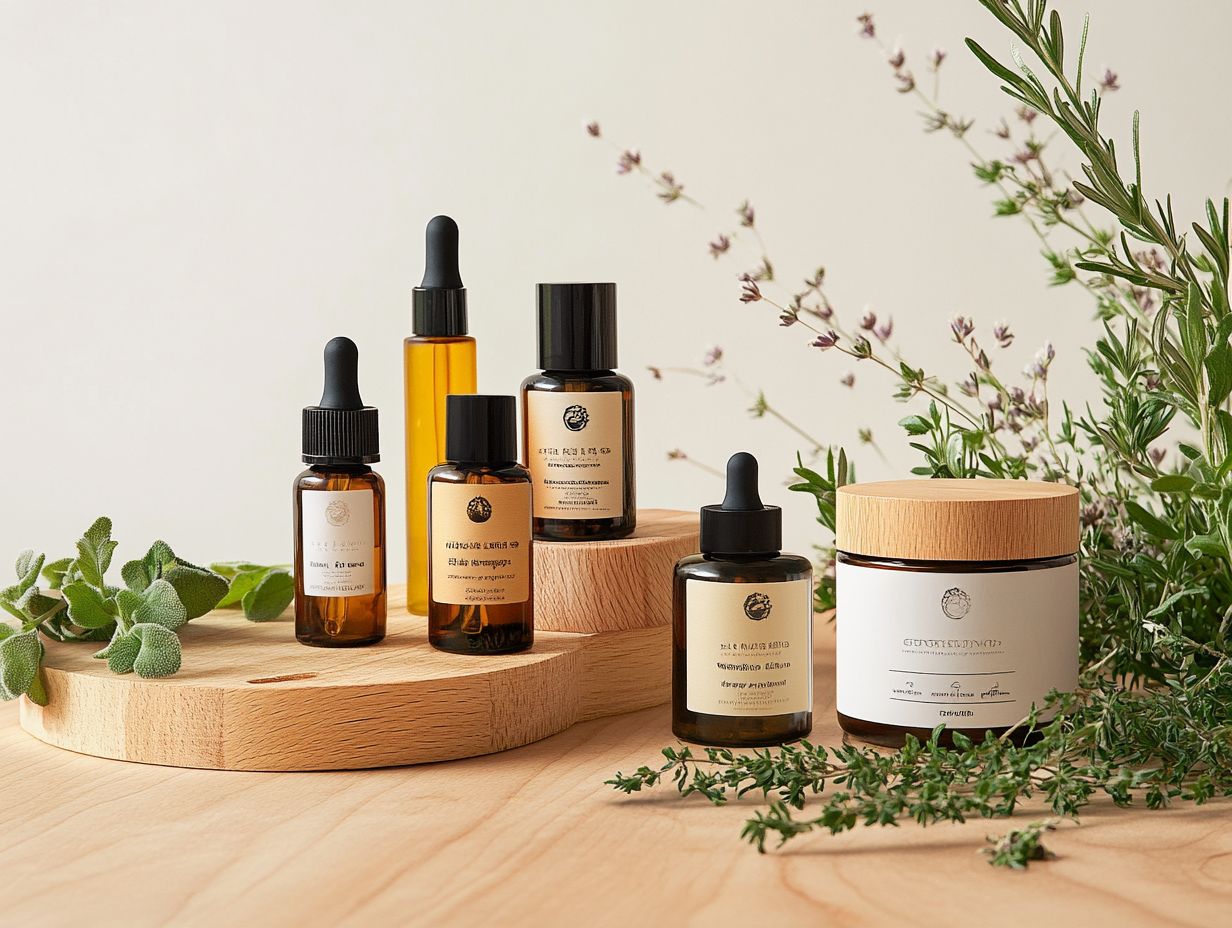
Creating my own skincare products through DIY methods presents a unique array of benefits and challenges that I believe every skincare enthusiast should consider.
On one hand, the ability to customize allows me to select ingredients that align with my skin type and preferences, enabling me to incorporate essential oils and other natural components that meet my specific needs. However, I recognize that the process can be time-consuming and may require some experimentation to achieve the desired results.
Having control over the ingredients means I can avoid the harsh chemicals and preservatives often found in commercial products, which is particularly advantageous for those of us with sensitive skin.
However, it is essential to be meticulous in measuring and researching formulations, as improper ratios can lead to ineffective or even harmful outcomes.
To navigate the DIY landscape successfully, I find it wise to start with simple recipes and gradually incorporate more complex ingredients.
Consulting reputable resources such as skincare blogs, books, or online tutorials provides valuable insights and sparks creativity in crafting my personal skincare solutions. Additionally, maintaining a skincare diary to track my progress enhances the learning experience, ultimately leading to improved results.
Tips for Maintaining Your Organic Skincare Routine
Maintaining an organic skincare routine necessitates dedication and consistency to achieve long-term benefits for my skin health.
I find it essential to establish a schedule for applying essential oils, soothing toners, and daily moisturizers to ensure that my skin receives the care it requires on a regular basis.
By developing habits that prioritize time for my skincare routine, I reinforce my commitment to self-care, which ultimately enhances my skin’s texture and appearance over time.
How to Stay Consistent and Make the Most of Your Routine
Maintaining consistency in my skincare routine is essential for fully realizing the benefits and achieving healthy, glowing skin. To optimize my regimen, I prioritize incorporating moisturizing oils and a daily moisturizer at appropriate times, ensuring that my skin remains hydrated and nourished throughout the day. Setting reminders and tracking my progress keeps me motivated to adhere to my routine and evaluate its effectiveness over time.
Establishing a schedule that fits my lifestyle greatly aids in maintaining this consistency. For example, applying products after cleansing in the morning and before bed provides a reliable framework that I can depend on.
It’s important to assess how my skin reacts to different products over several weeks, as the journey to radiant skin requires patience. This patience will ultimately reveal the true effects of my efforts.
By integrating a variety of nourishing oils into my regimen, I can further enhance hydration, while daily moisturizers work to seal in that moisture and support my skin’s overall texture. This strategic approach not only encourages commitment but also transforms my skincare routine into a rewarding part of my daily life.


